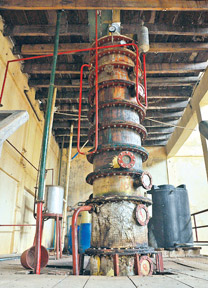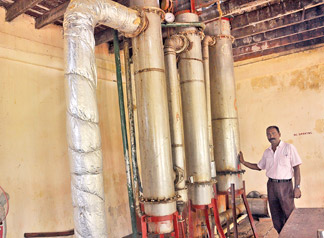Palmyrah arrack could be a lucrative trade
By Kurulu Kariyakarawana
Palmyrah is one of the main crops the northern capital of Jaffna has
to offer among a range of fruits and vegetables such as grapes, mango,
red onions, chillies, pumpkin and coconut that grow abundantly in its
rich red laterite soil. It is a wonder tree that gives us a variety of
products based on its fruits, sap, tender leaf and fibre as well as
tuber and other food products.
 |
|
Chairman Palmyrah
Growers Cooperative
Society S Kanesan |
 |
|
A bottle of palmyrah
arrack |
Palmyrah sap is a chief component used to make palmyrah jaggery,
treacle, sugar, vinegar and toddy. The latter is a popular and
traditional beverage among the northerners and is equally appreciated by
the southerners. But due to the accessibility problems and other
practical issues the tasting of this natural and refreshing drink is
limited to the northern peninsula.
Palmyrah arrack is a product that is popular among many. Brewed out
of the fresh toddy palmyrah arrack is a natural local alcoholic spirit
produced without any hazardous chemicals or preservatives. Distilled and
bottled in three main distilleries in Jaffna the bottle of palmyrah
arrack reaches the market in the north with a neat finish and at a
comparatively low price. Thousands make their livelihood from this trade
even after the war on terrorism, with plenty of resources. However, due
to reasons unknown poor attention is focussed towards the promotion of
this natural product in a market full of artificial spirits.
The Palmyrah Growers' Cooperative Society chairman, S Kanesan said
over 150 million litres of palmyrah spirit is currently stored in three
distilleries in the peninsula, but there's hardly any demand to produce
palmyrah arrack. The spirits had been distilled from the stocks of toddy
collected over the months from palmyrah growers throughout the
peninsula.
There are 24 committees affiliated to the Palmyrah Growers'
Cooperative Society in the Northern Province and about 10, 000 people
from these committees engage in the trade of growing and tapping
palmyrah. Also about 800 people work as helpers in the trade.
Palmyrah spirit is brewed from palmyrah toddy tapped by the skilled
labour. It is a traditional art that has been practised for many decades
since ancient times. Palmyrah sap is tapped from the inflorescence of
both male and female trees. Normally, a tapper goes up the tree twice a
day, morning and evening to collect the sap. First, the tapper
tenderizes the inflorescence by gently massaging it with a massaging
horn. It prepares the young inflorescence tissues for tapping. Then it
is sliced with a sharp tapping knife into very thin slices opening the
channels to flow the sap. It is collected in this manner twice a day,
normally, every 12 hours.
 |
|
Wooden vat containing
toddy |
The volume of sap collected per tree varies from three litres a day
from the mature inflorescence of male trees and eight litres a day from
the mature inflorescence of female tree. Fresh unfermented sap is known
as pathaneer or sweet toddy which can be consumed as a refreshing non
alcoholic drink. Many other products such as jaggery, treacle, sugar and
sugar candy are made out of pathaneer.
Palmyrah toddy is the natural fermented sap used to distil palmyrah
arrack. The toddy season starts from January to July where the excess
toddy is collected from the taverns and sent to three distilleries in
Vadamarachchi, Varany and Valikamam. The Thikkam distillery is the
largest which is in Vadamarachchi that has a capacity to distil 1350
litres per hour. The other two distilleries can distil only 3150 litres
a day. There is an excess of toddy during the season and large amounts
of it is thrown away. Due to this tappers are advised to supply a
limited amount of toddy to the taverns during the season.
In the Thikkam distillery the fermented toddy is distilled on a large
scale. The huge wooden vats containing thousands of litres of toddy kept
ready for distillation in the boiler, stand tall in a four storied old
building in a dilapidated state. The distilled spirit is collected in
large tanks in another section and stored for a future date or sent to
the bottling plant to produce arrack by mixing it with water.
A bottle of palmyrah arrack contains 30 percent distilled spirit with
a bottle of spirit (750ml) priced at Rs.400. A bottle of palmyrah arrack
is sold between Rs.500 to Rs.700 in the market inclusive of the Excise
Tax. At present all three distilleries in Jaffna have an excess stock of
distilled palmyrah spirit of over 150 million litres awaiting demand.
The less demand for the product and the inefficient promotional methods
have led a lucrative trade into waste.
Kanesan said the authorities had been informed about it on many
occasions but was of no avail as nobody has given a solution for the
stocked spirit which could be converted into a huge sum of money or
revenue if a method of sale at national level could be introduced or an
international market found. Especially, countries such as India has a
high demand for palmyrah products, including spirits.
 |
|
The boiler
Pix: by Susantha Wijegunasekara |
 |
|
The metal pipes
delivering the distilled spirits |
 |
|
The four storeyed
distillery |
The members of the Palmyrah Growers' Cooperative Society have spoken
to the Distilleries Company of Sri Lanka (DCSL) with regard to making
use of the product but they have shown a poor interest perhaps due to
the excessive price a bottle may cost if distributed to the South. It is
believed that a bottle of palmyrah arrack would cost around Rs.900 if it
is to reach Colombo, with added charges on transportation from the North
and other taxes.
In 2010 then Social Services and Social Welfare Minister Douglas
Devananda made a visit to the Thikkam distillery and had meetings with
the employees and management. The Minister made the visit on a request
of the employees of the distillery that the administration of the
distillery is deteriorating due to the inefficiency of the officers and
the management is unable to pay the remuneration of the employees.
When Minister Douglas Devananda was the Rehabilitation and
Reconstruction Minister he put the administration of the Distillery in
the correct path. But after the change of government again it is not
functioning properly.
The Minister convened a meeting following the visit with the
participation of the management of cluster cooperative society employees
and trade union representatives and appointed an Attorney at Law as
Competent Authority to inquire into the issue and submit a report.
When asked why the product is not promoted in the country the Excise
Commissioner General Wasantha Hapuarachchi told the Sunday Observer that
due to the high production cost it bears a high price which would face
stiff competition with other regular alcoholic beverages popular in the
South.
If the palmyrah growers need to sell the large stock of spirits they
need to lower the prices. The production cost is high due to the old
methods used in distilling. The machinery used in the Jaffna
distilleries are outdated, whereas modern high-tech equipment are used
in leading distillery companies in the South.
Also, the quality of the product is not up to modern standard
although not entirely unsuitable for consumption. The spirits currently
being distilled in Jaffna can be more refined with new machinery and
technology which could increase demand in the market among the other
popular brands of arrack. The bottling plants should also be renewed to
meet quality standards, the Excise Commissioner General said.
Palmyrah arrack is a dying trade that can be developed into a
lucrative business that could earn millions of rupees of revenue from
the North. Not only it gives a natural product for the local and foreign
consumers but also create employment opportunities for skilled labour in
the developing North. The expectation of the palmyrah growers is to
receive the attention of the competent authorities for their trade.
|


